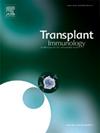The impact of ABO compatibility/incompatibility between donor and recipient of allogeneic bone marrow transplant on transplant outcomes
IF 1.4
4区 医学
Q4 IMMUNOLOGY
引用次数: 0
Abstract
Background
ABO blood group mismatch between donor and recipients is not considered as a major contraindication to allogeneic hematopoietic stem cell transplantation (allo-HSCT). Nevertheless, there is still conflicting reports on the impact of ABO incompatibility on allo-HSCT outcomes, including the risk of graft-versus-host disease (GVHD), relapse of underlying disease, and patient survivals.
Methods
We conducted a retrospective cohort study in 157 patients who underwent HSCT from October 1st 2019, to September 30th 2023, to determine the effect of ABO compatibility on allo-HSCT outcomes, as evaluating for pure red cell aplasia, engraftment time/status, chronic/acute allo-GVHD, and non-relapse mortality.
Results
Overall, 50.3 % of HSCT patients were ABO incompatible and 49.7 % of allo-HSCT patients were ABO compatible. Our findings suggest that the risk of pure red cell aplasia was significantly higher in cases with the major and bidirectional ABO incompatibility (P < 0.001) with odds ratio (OR): 19.8 [95 % confidence interval (CI): 2.3–2578.9; P < 0.001), and anti-A isohemagglutinin against donor red blood cells (RBCs) in the recipient serum is an important risk factor for this complication. Our results do not show any significant relationship between ABO incompatibility/compatibility on engraftment time and graft failure. The ABO incompatibility increased RBC transfusion burden but did not affect platelet consumption, the incidence and severity of acute and chronic GVHD, patient survivals and non-relapse mortality.
Conclusion
Our findings suggest that allo-HSCT with bidirectional ABO incompatibility with anti-A isohemagglutinins are associated with the occurrence of pure erythroid aplasia. However, ABO incompatibility did not affect the risk for acute and chronic GVHD, survival of patients, and all-HSCT engraftment status.
异体骨髓移植供体和受体ABO相容/不相容对移植结果的影响
供体和受体之间abo血型不匹配不被认为是异体造血干细胞移植(alloo - hsct)的主要禁忌症。然而,关于ABO不相容对同种异体造血干细胞移植结果的影响,包括移植物抗宿主病(GVHD)的风险、基础疾病复发和患者生存的影响,目前仍有相互矛盾的报道。方法:我们对157例2019年10月1日至2023年9月30日接受造血干细胞移植的患者进行了回顾性队列研究,以确定ABO相容性对同种异体造血干细胞移植结果的影响,评估纯红细胞发育不全、移植时间/状态、慢性/急性同种异体造血干细胞白血病和非复发死亡率。结果总体而言,50.3%的HSCT患者ABO血型不合,49.7%的同种异体HSCT患者ABO血型不合。我们的研究结果表明,在ABO主要和双向不相容的情况下,纯红细胞发育不全的风险明显更高(P <;0.001),优势比(OR): 19.8[95%可信区间(CI): 2.3-2578.9;P & lt;0.001),而受体血清中抗供体红细胞(rbc)的抗a等血凝素是该并发症的重要危险因素。我们的结果没有显示ABO不相容性/相容性对移植时间和移植失败有任何显著的关系。ABO血型不合增加了红细胞输血负担,但不影响血小板消耗、急慢性GVHD的发病率和严重程度、患者生存率和非复发死亡率。结论ABO与抗- a等血凝素双向不相容的同种异体造血干细胞移植与纯红细胞发育不全的发生有关。然而,ABO不相容并不影响急性和慢性GVHD的风险、患者的生存和全hsct移植状态。
本文章由计算机程序翻译,如有差异,请以英文原文为准。
求助全文
约1分钟内获得全文
求助全文
来源期刊

Transplant immunology
医学-免疫学
CiteScore
2.10
自引率
13.30%
发文量
198
审稿时长
48 days
期刊介绍:
Transplant Immunology will publish up-to-date information on all aspects of the broad field it encompasses. The journal will be directed at (basic) scientists, tissue typers, transplant physicians and surgeons, and research and data on all immunological aspects of organ-, tissue- and (haematopoietic) stem cell transplantation are of potential interest to the readers of Transplant Immunology. Original papers, Review articles and Hypotheses will be considered for publication and submitted manuscripts will be rapidly peer-reviewed and published. They will be judged on the basis of scientific merit, originality, timeliness and quality.
 求助内容:
求助内容: 应助结果提醒方式:
应助结果提醒方式:


